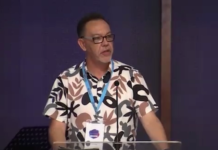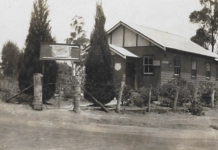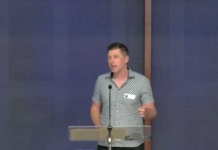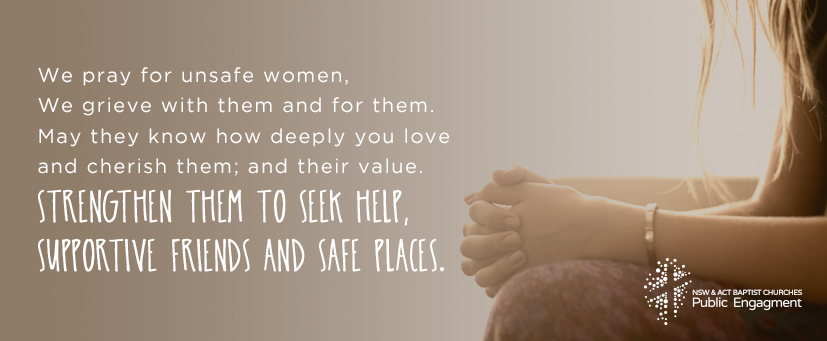
The 25th November marks the International Day for the elimination of violence against women. We are encouraging Baptist churches to join with the broader community in November to help raise awareness of this important issue.
Part of that response will be encouraging churches to consider the issue as part of their Sunday worship services. When we consider that it is highly likely that there are people in our churches who are in households that are violent, we are faced with an important question; How can we faithfully and helpfully consider violence in the context of our worship?
Let me offer a few reflections on this issue:
Our worship must engage with lament and mourning
One of the greatest truths and comforts we offer people suffering from domestic violence is that God is concerned for victims of violence and oppression.
In the Exodus narrative we’re told that Jesus identified the cries of his people in Egypt and came down because he was concerned for them. This concern for those who are marginalised and oppressed carries through the whole of the biblical story.
During his life Jesus protected women and showed compassion to them, especially those in need. On the cross Jesus not only bears our suffering and sin, he also identifies with the victims of injustice. Beyond that God also invites other believers to mourn with those who mourn (Rom 12:15) and in fact indicates that it is only when we mourn the injustices of this world that we will receive comfort from God (Matt: 5:4).
Our worship must bring truth to light
God is concerned for truth-telling. God brings to light that which is hidden in darkness. While our pastoral response to potential perpetrators is important, it must never get in the way of us exposing the truth of an injustice they have been responsible for. Too often the church has been guilty of protecting perpetrators rather than victims and this must stop.
Our worship must point towards hope
Not only does God identify with people in their suffering, God always moves people to redemption and renewal. This is the good news! This is the story of grace! The cross of Jesus is good news for both victims and perpetrators of domestic violence.
For perpetrators, it offers the way for repentance and forgiveness. Consequently, it opens the way for them to be restored into relationship with God and with the victims. We know that this offer of grace was costly to God, so we must be careful not to offer cheap grace. However, this redemption and reconciliation is always the goal of God’s work through the church.
Our worship must lead to confession and repentance
Our worship must clearly demonstrate that our holy God abhors violence and oppression of another. Therefore, the only appropriate response from perpetrators is repentance. We must ask for the Spirit of God to convict perpetrators of their sin, to seek forgiveness and them prompt them to do what is necessary to seek a new way forward.
Collectively, as God’s people, we must also seek repentance for the times we have condoned or ignored violence, or for the times when we have not done enough to seek to redeem our culture’s propensity for violence.
Our worship must lead people to embody and demonstrate a different way of life
The way we teach about discipleship should very clearly and consistently highlight that the way of Jesus, the way of the cross, is not to seek to control the other, but to give up oneself on behalf of the other.
It is a sad reality that the majority of women who experience physical violence are abused by someone known to them, and usually an intimate partner. While different interpretations exist within our churches regarding the nature of the marriage relationship, it is crystal clear that the husband’s role is to follow the example of Jesus and sacrifice himself for the good of his wife. Violence and coercion represent the way of the world and never the way of Christ.
We encourage you to join us in raising the conversation about domestic violence in churches. You can find resources to help you at https://nswactbaptists.org.au/public-engagement/domestic-violence/
While it is a difficult issue that needs pastoral sensitivity, our worship will be richer for bringing it to light. And our faith communities will be richer for helping both victims and perpetrators to walk the path of grace towards repentance, forgiveness and healing.




































